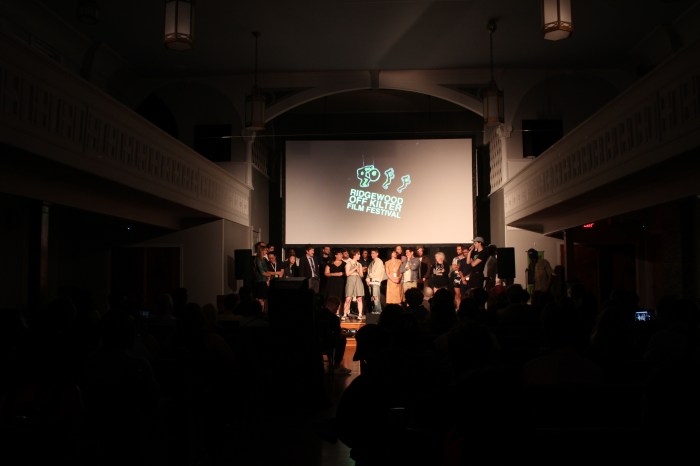BY SAM SPOKONY | “The utopia is gone,” said Michele Zalopany — a resident of the Chelsea Hotel for 22 years — as she stood outside its plaque-ridden façade on the afternoon of August 1. Later that evening, the hotel was finally sold (in a deal reportedly worth around $80 million) to real estate mogul Joseph Chetrit.
The hotel currently has a sign on its front door announcing its “temporary” closure (which occurred on August 2, to make way for a year-long series of renovations). While the exterior of the world-famous building at 222 West 23rd Street is officially landmarked by the city — as well as having been placed on the National Register of Historic Places by the federal government — Chetrit has the latitude to remodel the interior as he sees fit for future business (a process that began almost immediately after the building changed hands).
With almost no indication of the impending sale (stalled for weeks due to Chetrit’s difficulty in financing his purchase of the building from the previous owner, BD Hotels, LLC) and with no prior warning, management began removing short-term guests from the hotel on July 31. A state of confusion reigned as tenants and union workers watched the mass exodus of first-time tourists and perennial visitors. Some did not go quietly.
Jeffery Stewart, a British actor who had just attended the Manhattan Film Festival (where he won the award for Best Actor) and was scheduled to stay until August 2, felt as if he was being hounded. After being woken at 9a.m. on August 1 by phone calls from the front desk and pounding on the door from security, Stewart called the police for protection — but was forced to leave after a manager read him the fine print in his reservation contract. The fact that he was reimbursed for the cost of two nights in exchange for losing his last was little consolation.
“I’ve been coming to the Chelsea for ten years,” Stewart said as he checked in at the Savoy Hotel down the street. “The word sad gets used for so many things, but honestly, this is just incredibly sad.”
Established in 1884 and reopened in 1905 (after a tumultuous bankruptcy), the Chelsea Hotel was purchased in 1939 by Joseph Gross, Julius Krauss and David Bard. Bard’s son, Stanley Bard, took over in 1955. Over the course of the Bard family’s leadership, the hotel became a haven for some of the world’s greatest thinkers and artistic personalities. Notable residents included Bob Dylan, Leonard Cohen, Dylan Thomas and Arthur C. Clarke, among many others. It was also the scene of legendary excess — and crime (Nancy Spungen was allegedly stabbed to death there, in 1978, by Sex Pistols member Sid Vicious).
Residents and employees fondly remember the supportive, permissive lifestyle allowed by Stanley Bard. Bard’s stable presence, in the face of cultural, social and economic instability throughout his reign, led to a hostile relationship with his successors. Many tenants never stopped advocating for his return.
“Oh, everything was better under Stanley Bard,” said Jerry Weinstein — an employee of the hotel for 35 years who gave tours of the building until it closed last week. “Everything was more enjoyable. I’m waiting it out now, and I’d rather not stop working. But at this point, I think it would be okay to stop.”
The hotel’s board of directors ousted Bard in 2007 — when Dr. Marlene Krauss (daughter of Julius Krauss) and David Elder (son of Joseph Gross) replaced him with BD Hotels, LLC and manager Arnold Tamasar. To many of Bard’s admirers, that change was the beginning of the end regarding the way of life they had become accustomed to.
“When [Tamasar] first came in to manage the place, it seemed as if they lost the vision of what the Chelsea could represent,” said Tsakwe Ibrahim, who grew up in the hotel and has lived there for 35 years. “It was just a bunch of suits.” Zalopany went further, saying that she believed Tamasar “came in here with an agenda to sell the hotel from day one.”
After sale, immediate changes
While guests were being removed and the tenants watched in silence, members of the Local 6 Union — the hotel’s cleaning staff, engineers and bellmen, among others — were told by Chetrit’s managers that they shouldn’t bother showing up to work. The 37 union workers were kept largely in the dark until the deal was finalized, and have no legal recourse against the lack of notice given before the hotel closed on August 2. The federal WARN (Worker Adjustment and Retraining Notification) Act requires an employer to let employees know about a business shutdown 60 days in advance of closing — but that statute only applies to institutions with 50 or more workers.
According to a source close to the situation, Chetrit signed an assumption agreement with Local 6 as part of his purchase of the hotel, meaning that he is now a party to the union’s collective bargaining agreement. This sets the stage for the contract to run through July 2012, while allowing Chetrit to close the hotel as long as he follows the steps in the contract. It is unclear if Chetrit plans to keep the building as a hotel (his office did not return phone calls and emails seeking a statement).
Union workers are currently being paid normal wages for one month while they remain inactive. Local 6 representatives will be meeting with Chetrit before that to discuss the future of their employment at the hotel. Union members do not currently have the right to come back to work once the renovations are complete, and their contract expires (assuming the building reopens as a hotel next year).
To the tenants — many of whom, like Zalopany, have lived there for decades — the fact that none of the union members are currently on site means they do not have access to services provided by cleaning and garbage staff. Instead of working to reestablish those amenities, Chetrit and his managers have, according to the residents, launched into the preliminary steps of renovation.
“I don’t know what the status of the hotel is going to be, because I don’t know enough about Chetrit and he hasn’t really gotten in touch with any of the residents,” said a tenant of 15 years who asked not to be identified. “But they’ve taken all of the artwork off the walls without any notice and they’ve put padlocks on all the former guest rooms. And I got a letter telling me to make my rent checks out to Chelsea Dynasty, LLC [a subsidiary of the Chetrit Group].”
things to come?
The most urgent question for tenants, along with the need to regain housekeeping services, is whether or not their rooms will remain theirs. As of press time, Chetrit had not made any direct effort to contact the residents — leaving some to speculate whether that silence is benign or an omen of more changes to come. Referring to the possibility of attempts by the new management to buy out tenants in order to clear the way for more hotel space, Ibrahim said that he “hadn’t heard of anyone trying to do that yet, but I’m sure they’ll try it. It’s a constant concern.”
“But the weird thing,” said a tenant of 18 years who wished to remain anonymous, “is that the people who live here are way friendlier now. People I know from around but never talked to, they see me in the elevator and say, ‘Oh, hey, how are you?’ All of a sudden, there’s this closeness, I guess because we’re the last survivors.”
For some veteran tenants and employees, Chetrit’s entrance will prompt a move to another building. For some, it will mean retirement. As with the ouster of Stanley Bard, this latest forced change to the way of life at the hotel brings with it a reevaluation of the ideological pillars on which the Chelsea Hotel has stood for so many years.
“Yeah, the only thing that’s protected is the façade, everything on the outside,” said Ibrahim, referring to the hotel’s landmark status. “So [the new management] can do anything they want on the inside, change as much as they want structurally. That might be what they’re doing. But that would be so detrimental to what the hotel stands for, because it’s the stories of those little rooms that create the vibe.
“And they need to think about historical preservation,” he continued. “Get more artists in, get more writers in. Some of that artwork was up there for 30 years, and, to be honest, not all of it was really aesthetically pleasing. But that’s just another reason for them to cater to more artists of this generation who are interested in keeping the legacy alive. To do it all over again. Why not? For the next century, why not?”
































